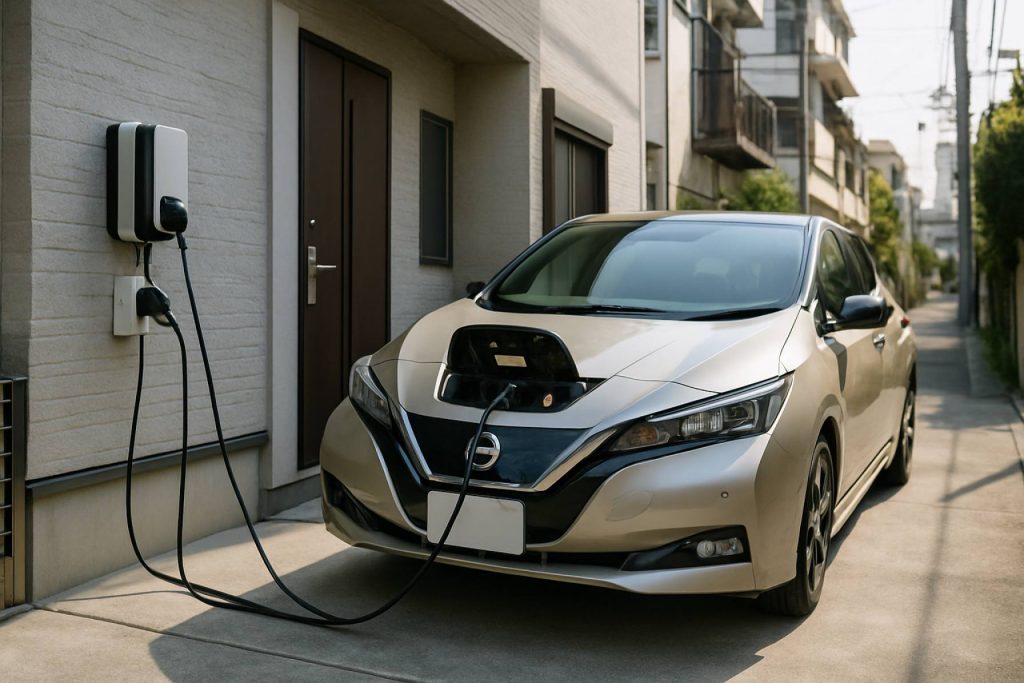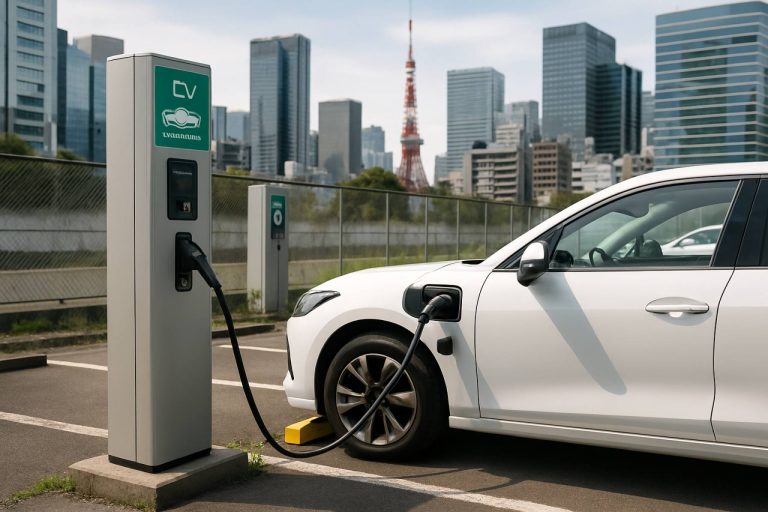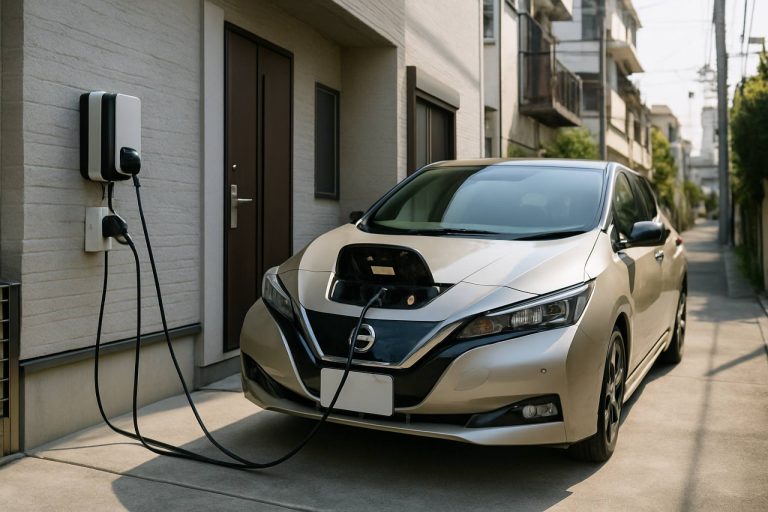
- Tokyo introduces an affordable home EV charging program, offering high-performance 6kW chargers to detached house owners for just 29,999 yen (about $190).
- Installation, normally costly and complex, is streamlined by partnerships with companies like Jigowatts and supported by the city’s Residential Charger Promotion Program.
- The chargers deliver full overnight charging, feature modern designs, and include future-ready connectivity for smart homes.
- The initiative, open from June 27, 2025 to March 31, 2026, is limited to single-family homes in Tokyo.
- This move addresses range anxiety and supports widespread EV adoption, setting a benchmark for urban electrification globally.
The Tokyo skyline, once dominated by gasoline fumes and the hum of combustion engines, is turning electric at record speed. A seismic shift now gives the city’s homeowners a compelling reason to plug into the future.
Imagine charging your electric vehicle overnight—right at your doorstep—for less than the cost of a weekend shopping spree. That’s now possible for Tokyo residents, thanks to an unprecedented offer that sweeps away the age-old obstacle of high installation costs for home charging equipment.
This game-changing initiative isn’t just a sweet deal—it throws wide the gates to electric vehicle (EV) adoption in some of Japan’s most densely populated neighborhoods. Homeowners in Tokyo’s detached houses are now eligible to secure a high-performance 6kW EV charger for just 29,999 yen (about $190), provided they participate in the city’s ambitious charging infrastructure program.
A Technological Leap
The heart of this offer is the “industrial model” EV charger (JW-EVSE-6KI-055-PIYO), a device that doesn’t just look sleek, but packs a punch. With up to 6kW of output, it recharges most EVs overnight, ensuring drivers wake to a full battery and a sense of reassurance. A robust 5.5-meter cable (with an optional upgrade to 8 meters) caters to tight city driveways and modern home layouts. Best of all, built-in communication technology future-proofs your home as the Internet of Things reshapes daily life.
The Roadblock: Cost
For years, the dream of at-home charging—so essential for EV convenience—remained just out of reach for most Tokyoites. Installation costs could soar beyond $1,000, not including essential electrical work. That wall has crumbled, thanks to creative partnerships between local government and forward-thinking companies like Jigowatts Corporation.
How It Works
Homeowners who pay the upfront price can apply for reimbursement under Tokyo’s “Residential Charger Promotion Program,” potentially slashing their out-of-pocket cost to well under 30,000 yen. Electrical work? No hassle. Jigowatts handles the details, stripping away logistical headaches. The program opens on June 27, 2025, and runs until March 31, 2026—or while supplies last.
There’s just one catch: the offer is limited to single-family homes within Tokyo, leaving apartment dwellers watching from the sidelines (for now).
Implications for the EV Revolution
As the world’s automakers accelerate their shift to electric—major Japanese brands included—Japan’s metropolises face mounting pressure to catch up with Tesla-driven rollouts in Europe and America. Investment in residential infrastructure is crucial for combating “range anxiety,” a key barrier to mass EV adoption.
By lowering the bar for home charging, Tokyo sends a clear signal: the EV era is no longer a vision—it’s daily life, within reach for real families.
Key Takeaway: For Tokyo’s homeowners, going electric isn’t just a statement—it’s suddenly affordable, practical, and compatible with daily routines. As the program gains traction, expect more Japanese cities—and perhaps the world—to watch and emulate Tokyo’s electrifying example.
Why Tokyo’s Home EV Charger Revolution Is a Game-Changer (and What It Means for the Future)
Introduction
Tokyo’s move to make residential EV chargers accessible and affordable is a seismic leap for Japan’s green revolution. For the first time, owning and charging an electric vehicle at home is both practical and affordable for many Tokyoites. Here’s everything you need to know—plus deeper insights, compelling use cases, industry trends, pros & cons, and actionable tips.
—
Additional Facts & Industry Context
1. How-To: Installing a Home EV Charger in Tokyo
– Eligibility: Only single-family home owners in Tokyo qualify; apartments and condominiums are excluded.
– Steps:
1. Purchase the 6kW JW-EVSE-6KI-055-PIYO charger from a certified vendor such as Jigowatts Corporation.
2. Submit an application through the Tokyo Residential Charger Promotion Program.
3. Schedule installation—Jigowatts handles the logistics.
4. Apply for city reimbursement to receive the discounted price (about $190).
– Tip: Prepare your home’s electrical system in advance by having an electrician assess your main panel for compatibility.
2. Real-World Use Cases
– Daily Commuters: Owners can charge overnight, ensuring a full battery every morning—eliminating “range anxiety.”
– Two-Car Families: Households with two EVs can install multiple chargers, future-proofing for expanded EV ownership.
– Work-from-Home Professionals: Enjoy flexible charging schedules, taking advantage of off-peak electricity rates.
3. Features, Specs & Pricing
– Charger Specs:
– Output: 6kW (suitable for most passenger EVs)
– Cable Length: 5.5 meters (or optional 8 meters for larger properties)
– Smart Communication: Built-in IoT capabilities for remote monitoring and upgrades
– Price: 29,999 yen (~$190) after subsidy (Installations used to cost $1,000+)
– Comparison: According to the International Energy Agency, similar home charging units in Europe and North America typically cost $500–$1,200 without incentives ([IEA.org](https://iea.org)).
4. Security, Sustainability & Compatibility
– Security: Units feature tamper-resistant housings and encrypted communication modules to deter unauthorized use and protect data.
– Sustainability: Charging at home, especially with Japan’s increasingly renewable energy mix, reduces grid strain from peak-hour charging and supports national decarbonization goals.
– Compatibility: The charger uses a J1772 (Type 1) connector, standard for Japanese and North American EVs; European visitors may need an adapter.
5. Market Forecasts & Industry Trends
– Japan’s National Goals: The Japanese government aims for 100% of new car sales to be clean energy vehicles by the mid-2030s ([METI.go.jp](https://meti.go.jp)).
– Residential EV Infrastructure: BloombergNEF forecasts show that widespread home charging is critical to scaling up national EV adoption rates—Tokyo’s model could be replicated in other megacities worldwide.
– Apartment Charging Lag: Currently, over 50% of Tokyo’s population lives in multi-unit dwellings, highlighting a major gap/opportunity for future policy shifts.
6. Pros & Cons Overview
Pros
– Ultra-low cost—removes the single largest residential EV adoption hurdle.
– Overnight charging eliminates public charger queues and infrastructure bottlenecks.
– Long cables and smart tech cater to diverse home layouts.
– Increases property value and appeal to future buyers.
Cons
– Excludes apartment, condo, and rental tenants—potential equity issue.
– Supply is limited—potential for rapid sell-out or waitlisting.
– Installation still requires minor electrical upgrades for some older homes.
– Not all EV models may be perfectly compatible without an adapter.
—
Most Pressing FAQs Answered
Q1: Can I get more than one charger for my house?
A: Yes, but each charger requires a separate application. Approval may be limited by available circuit capacity.
Q2: Are there ongoing maintenance costs?
A: Minimal. Routine inspection is recommended annually. Most units have a manufacturer warranty of 3–5 years.
Q3: What about renters and apartment residents?
A: Currently ineligible, but Tokyo is piloting shared parking lot chargers for apartment complexes as part of its future infrastructure roadmap ([Tokyo Metropolitan Government](https://tokyo.lg.jp)).
Q4: Is off-peak (nighttime) charging cheaper?
A: Yes, many Tokyo energy providers offer discounted nighttime electricity rates, making overnight home charging highly cost-effective.
Q5: What brands of EVs are supported?
A: Most Japanese and overseas EV brands (e.g., Nissan, Toyota, Honda, Tesla with adapter)—check compatibility with the J1772 standard or consult your dealer.
—
Controversies & Limitations
– Policy Critique: The exclusion of multi-family dwellings means a significant segment of Tokyo’s population cannot access the subsidy, potentially widening the “EV privilege gap.”
– Supply Chain Risks: The dramatic price drop might spark rapid demand, risking temporary shortages unless supply chains are ramped efficiently.
– Environmental Impact: While EVs significantly reduce tailpipe emissions, manufacturing and battery disposal still have ecological impacts—important to consider for holistic green policies.
—
Actionable Recommendations & Quick Tips
– Act Quickly: The program is first-come, first-served. Secure your spot early when applications open.
– Consult a Licensed Electrician: Ensure your home’s circuitry can handle a 6kW device; older homes may need upgrades.
– Monitor Policy Updates: Keep tabs on expansion efforts for multi-unit dwellings—future eligibility could open up.
– Install Smart Home Integration: Leverage the charger’s IoT capabilities for remote scheduling, energy tracking, and optimal cost savings.
– Consider Home Solar: Pairing your charger with rooftop solar maximizes environmental and financial benefits.
—
Conclusion
Tokyo’s bold move to crush the cost barrier for residential EV charging sets a powerful example for global cities. While current exclusions exist, especially for apartment dwellers, this program accelerates mainstream EV adoption and modernizes the city’s infrastructure for the clean transportation revolution. If you own a home in Tokyo, don’t miss this limited-time opportunity to join the future of mobility—affordably, efficiently, and sustainably.
—
For more information on innovative EV charging solutions and urban mobility trends, visit the official Jigowatts Corporation or global leader Tesla.



